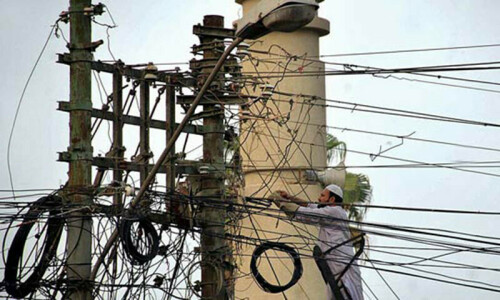A CRACK of the whip was all that was needed. The dollar, which had lately been racing to a new high each day, has now reversed course thanks to an army-sanctioned operation against hoarders and black marketeers.
Local media reports that confidence in the rupee has strengthened and that now there are more sellers than buyers in the market.
Meanwhile, social media has been flush with accounts of unscrupulous elements being arrested with breathtaking stashes of foreign currencies, which have subsequently been confiscated by the state.
It remains difficult to sift truth from fiction, however: after all, the state has not shared how this crackdown was planned and executed, who was targeted, and precisely what role the suspects arrested so far played in manipulating the exchange rate.
While the sharp improvement in exchange rates cannot be denied, the citizenry also deserves to know how and why the market was rigged in the first place.
One wonders that if administrative measures were all that were needed to arrest the rupee’s sorry slide, why were they not taken sooner? Why did the finance minister in the PDM government not consider this option as he struggled and failed for months to keep the exchange rate in check?
After all, the cost to the country of rounding up a few dozen big fish involved in the currency market racket would have been far lower compared to the lasting cost of creating distortions in the economy by placing artificial and unsustainable controls on the exchange rate.
The same question can also be extended to ask why the civil administration was never utilised during the PDM era to control market manipulation in other segments of the economy either. Why were the country’s regulatory authorities not mobilised to safeguard the interests of common citizens pleading for support under record inflation?
It seems that when economic historians sit down to reflect on the PDM era, they will find themselves hard-pressed to say anything charitable about the competence of the people at the helm during one of the country’s worst crisis periods.
That is not to say that the current lot offers much hope. The country is presently managed by a caretaker set-up, but its ministers’ promises seem to betray a wider mandate. Yet they seem to be in very little hurry to take the ‘difficult decisions’ that are supposed to justify them overstaying their welcome.
Successful though it may be, a crackdown against currency dealers can only create limited breathing space. The situation demands that an empowered government, elected by the people, take over post-haste so that responsible decisions can be taken to protect the public’s interests.
Alas, this more permanent solution seems to be unacceptable to the wise souls managing Pakistan’s affairs these days.
Published in Dawn, September 21st, 2023














































Dear visitor, the comments section is undergoing an overhaul and will return soon.